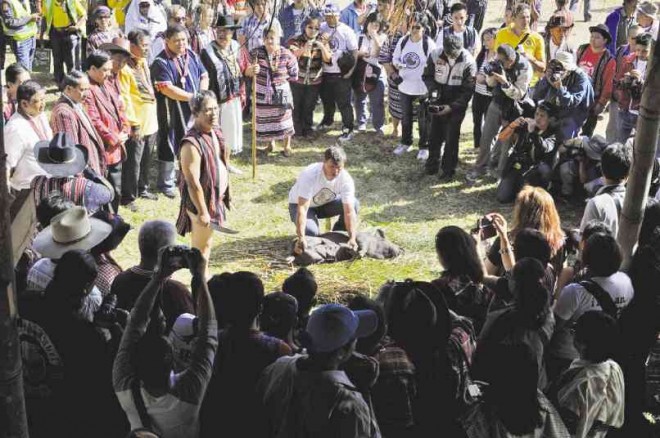Ibaloi join Baguio fest amid land controversy

IBALOI delegates from various towns in Benguet province participate in the Diyaw ritual, mounted by Baguio Ibaloi families, to welcome them to the first Ibaloi Festival in Baguio on Feb. 2. EV ESPIRITU/ INQUIRER NORTHERN LUZON
BAGUIO CITY—Ibaloi folk from Baguio’s neighboring towns in Benguet province joined the summer capital’s Ibaloi Festival parade on Sunday to promote their culture amid unresolved debates concerning ancestral lands that had polarized the local community.
The towns of Atok, Tublay, Tuba, La Trinidad and Bokod sent delegates, who danced to the sound of gongs as they paraded along downtown Baguio in their traditional black, white and red G-strings, vests and skirts, while wrapped in blankets to ward off the cold.
“These are the first people of Baguio City,” said Jimmy Fong, a University of the Philippines (UP) Baguio communications professor, who helped organize the festival.
The parade launched a set of activities for February, among them workshops and lectures about the Ibaloi language and rituals before they celebrate Ibaloi Day on Feb. 23.
Rosela Camte-Bahni, one of the organizers, said the festival honors Ibaloi heritage, which she described as “the soul of Baguio City.”
Article continues after this advertisementThe pioneer Ibaloi, many of them cattle raisers, were displaced when the American colonial government designed and built Baguio City.
Article continues after this advertisementThe participants steered clear of the controversies surrounding the issuance of certificates of ancestral land title (CALT) benefiting some Ibaloi families, which covered parks, a portion of the presidential Mansion and the city’s oldest hotel, Casa Vallejo.
Already beset by unabated squatting and problems with applications for townsite lands, the city government has challenged these CALT because of allegations that ancestral lands have been sold to developers.
Baguio Ibaloi families discussed the problem at a Jan. 25 dialogue sponsored by UP Baguio.
There are 757 ancestral land claims in Baguio, records showed.
The National Commission on Indigenous Peoples (NCIP), the agency that issues these titles, froze all action on ancestral land claims because of the Baguio controversies.
A loophole in the ancestral land law allows land speculators to buy titled Ibaloi lands, said lawyer Reynaldo Agranzamendez, dean of the University of the Cordilleras’ College of Law, during the dialogue.
Although Republic Act No. 8371, or Indigenous Peoples’ Rights Act of 1997 (Ipra), allows the CALT to be transferred only to a clan member or another member of the tribe, it also grants them time to redeem lands sold to an outsider. This suggests that land sales to nontribal members are allowed, Agranzamendez said.
But ancestral land titles would not be necessary if Baguio is recognized as an ancestral domain instead, said lawyer Jose Molintas, an Ibaloi and a former Baguio councilor.
Agranzamendez said certificates of ancestral domain title (CADT) recognize vast tracts of land owned by a community or a tribe, and may not be sold unlike CALT, which recognize private individual lands. A CADT had been awarded to the Ibaloi-Kankanaey community of Happy Hallow village within the Camp John Hay reservation here.
Ipra also requires CADT beneficiaries to map out their intentions for their communal lands through the Ancestral Domain Sustainable Development and Protection Plan.
The city’s townsite reservation, including privately titled lands and reservations, would be shielded from the domain coverage because Section 78 of Ipra exempts these lands from being processed for ancestral land titling.
The Baguio CADT option needs to be discussed by the major Ibaloi clans of Baguio, who would be gathering for Ibaloi Day on Feb. 23, said Joanna Cariño, a member of one of the pioneer Ibaloi clans in the city. Vincent Cabreza, Inquirer Northern Luzon